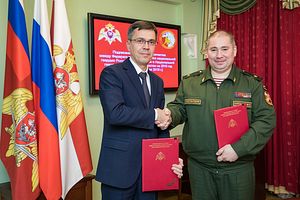The National Guard of Uzbekistan was a thousand-strong paramilitary body created in 1992 without clear functions. Since President Shavkat Mirziyoyev ascended to power, the guard has enjoyed overwhelming support from the government in re-emerging as a major domestic law and order body. Mirziyoyev not only delegated the tasks of protecting public order, fighting domestic terrorism, and guarding state assets to the guard but also trusted his own protection to the guards.
In February, the agency made into news twice within two days for different reasons. This post reviews these events in the context of transformations the agency has undergone recently.
The first bit of news regarded the National Guard’s visit to their Russian counterpart, Rosgvardia, on February 15 to sign a cooperation agreement for 2019. The delegation was headed by the guard’s second top official, Commander Colonel Shuhrat Shakirov. A framework agreement was signed between heads Viktor Zolotov of Rosgvardia and Commander Bakhodir Tashmatov of the National Guard of Uzbekistan back in October 2018 during Russian President Vladimir Putin’s visit to Tashkent. The framework agreement stipulated cooperation in ensuring public order, guarding government assets, and fighting terrorism.
Cooperation with Russia is the most recent, but hardly the only development in this area. In January 2019, the Uzbek National Guard trained with Chinese colleagues from the Chinese Ministry of Public Security, which oversees domestic police activity. Last year, in February 2018, Tashmatov visited his colleagues in the Turkish Gendarmerie General Command, the service branch responsible for public order.
The National Guard of Uzbekistan was initially created in 1992 within the Ministry of Interior Affairs. The agency was given broad functions then, such as protecting the independence of the country, protecting the constitutional rights of people and their freedoms, and ensuring the indivisibility of the territory of Uzbekistan. In his January 2018 address to his Security Council, Mirziyoyev lamented about the National Guard being shuttled between the Ministry of Defense and Ministry of Interior, which led to the lack of training and weakening of the agency.
In the same speech, Mirziyoyev indirectly marked the rebirth of the National Guard. He spoke of the National Guard as a newly created body and narrowed the agency’s functions to the protection of public order, guarding the president, guarding select government assets, and fighting terrorism. On the matter of public order, the president requested the police and guards to cooperate to ensure public safety. In June 2018, the president’s vision was transferred into law with the re-establishment of the National Guard, and the law on “Fighting Terrorism” was edited to define functions of guards in fighting against terrorism. In January 2019, the president proposed transferring the functions of the Ministry of Interior’s Protection Services, which guards state assets, to the National Guard.
The current commander of the National Guard, Bakhodir Tashmatov, served as the first deputy minister of defense twice prior to assuming his current role. The latest ministry position was before his current post and the other before his December 2011 appointment to head the Security Council.
The second piece of news involving the National Guard broke on February 16, when a surveillance video that allegedly depicted a uniformed National Guard personnel entering an empty karaoke club room in Kokand to hide a knife under a pillow began circulating on social media. Several minutes later, the same guard leads police to “find” the knife. (Seizure of knives has turned into a major function of law enforcement bodies in Uzbekistan due to an increase in knife-related crimes.) The National Guard quickly reacted to the incident and reported that the individual caught on camera planting the knife is under investigation. Nevertheless, the incident is an example of the old schemes employed by Uzbekistan’s security services to “eliminate” individuals and businesses for the purpose of extortion and other illegal pressures still in play.
Uzbekistan has a number of military structures along with the National Guard: the Ministry of Defense, combat units of the Ministry of Interior, the State Security Service, Ministry of Emergency, and the Customs Service. Currently, the National Guard is soaring above these agencies in domestic matters. Initially created as a Ministry of Interior department, the agency has reemerged as an independent body cooperating with foreign partners. Yet, the incident of a National Guard personnel planting a knife indicates that the agency is far the days of corruption and still far from serving as an exemplar domestic security force.
































